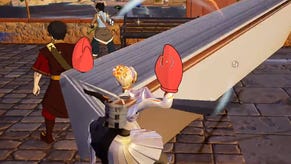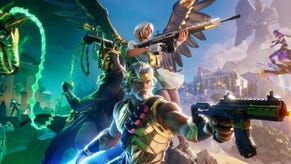How Epic Hopes To Avoid Pay-To-Win With Fortnite
House Of Gold
Fortnite is, technically speaking, Epic's first free-to-play game. The crayola colored smash-and-shoot-and-loot-and-build-er is being designed primarily as a co-op thing, but with persistent MMO-style progression underlying it all. There's also still-nascent PVP in the works, further necessitating balance in the name of fair fun. Fortnite is, however, a giant mixed bag of moving parts, multiple genres (action, building, crafting, a Gears-of-War-style horde mode, etc) mashed together. How do you make all of that free-to-play without mucking it up?
I asked producer Roger Collum about Epic's plans, influences from games like League of Legends and Team Fortress 2, the potential emergence of a tedious grind with things like XP boosters in the mix, whether or not you can really equate time and money as free-to-play devs so often do, and more. It's all below.
RPS: You've mentioned League of Legends a lot, especially in regard to your business model. How will that work, though? Fortnite seems pretty drastically different from a MOBA, at least so far. I mean, there are only a few classes, for one thing.
Collum: Looking to League of Legends as a model for good free-to-play is definitely not a bad thing. I mean, League has a huge audience, and we're espousing that we're not pay-to-win. League is definitely not pay-to-win. So there's that.
Also, if you don't have a large number of people playing for free, then the paying people won't have anybody to play against, right? You need people to fill worlds. That adds value to the game.
We've looked at League as a model for possible PVP stuff. Don't have anything nailed down, though.
RPS: OK, so break down for me what a free player will experience when they play Fortnite. What will they have access to? What will be blocked off, if anything?
Collum: The free experience we envision is one we feel like, if they invest the time, they're getting the same experience as someone who's spending money. Using League of Legends as an example, I know people who spend a ton of money on it, and I know people who don't spend a cent. The people who don't spend anything still have a great time. They can try out classes and still fully experience what a MOBA is.
That's our goal for Fortnite - to have that kind of freedom and that level of communication with our community. I think if you nickel-and-dime people, they're not gonna show up.
If we hit millions of users and only a fraction of those people pay, we're still gonna be able to pay our bills. We'll still feel successful. We'll still feel good about it as a business model. What's exciting to me is that Gears and Unreal Tournament are successful games, but nowhere near the numbers that Dota gets. If we could get an audience in the hundreds of millions worldwide playing Fortnite, that would tickle me pink. We don't need them to spend money.
RPS: You talk about investing time versus investing money. But that distinction, I think, has led to some of the worst elements of F2P. Time gates, for instance - giant neon stop signs that basically say, "If you don't pay, you can't play anymore today."
Collum: Oh yeah. As gamers ourselves, we're irritated at a lot of the free-to-play practices that some games apply. Time gates, things of that nature. 'You get X number of turns per day unless you spend money.' That's super lame. We don't want to do anything like that.
Look at TF2, for example. Their primary source of income for that game is cosmetics. They don't really provide power. We're not interested in providing power. Maybe we'll provide health or XP boosts, things that can accelerate time, but we're not gonna make time a hindrance to players.
RPS: I'm definitely glad to hear that. That said, even XP boosts can be a problem sometimes. It's tough to get level-up pacing just right so that it's not a total grind for non-paying players. I mean, even otherwise really excellent games - for instance Tribes Ascend, off the top of my head - had trouble with that.
Collum: I'm an RPG player so I like the grind. Maybe I'm totally weird in that way. Like Dark Souls, you keep beating yourself against the wall because it's fun. I don't think we're gonna get to that point, though.
People who don't pay are gonna have to work. There's gonna be some level of work, but it'll be satisfactory. It'll be like in an MMO where you're busting your butt to get to the next level and then you're like, 'Hurrah! I did it!' I think we're gonna generate that experience.
RPS: You've also mentioned a booster-pack-style system - something with an element of randomness to it. What all will come in those?
Collum: Right now we envision primarily cosmetics. We haven't really worked out all of our plans on what will work there. We're gonna look at our audience and see what they think is valuable. We could say hats and backpacks and shoes and beards and glasses. That's the initial plan, but I don't know if that's compelling. I think they will be, but we need to investigate.
We don't want it to come down to balance between a paying player and a free player. We don't want it to seem punitive if you don't spend money. But we do want people to feel value for money. So it's that weird dichotomy where we don't want people to feel bad for not spending, but we do want people to feel value if they spend money.
The first free to play game that got me to spend money was Vindictus, the Nexon MMO. The reason I spent money is because I didn't have a lot of time to play. The people I was playing with had a ton of time. They way I could still contribute to that group was by spending. So I could buy XP boosts and defense shields and whatever - things that socially helped the rest of the group. I ended up being the guy with the money that helped improve the experience, and I got to feel socially good about doing that. I felt earnestly like, 'Wow, this is awesome.'
I'm hoping we can engender some of that where people feel good about contributing to their team by spending a little money. Benefit the whole team while people who are investing time as a currency are contributing to the team in that way, by building the awesome base or grinding out crafting ingredients or whatever.
RPS: Once again, though, it goes back to that weird equivalence between time and money. In this case I think spending money only makes you a financier. Playing, being a part of the moment-to-moment struggles and triumphs, that makes you a friend. I'm sure there's a happy midpoint between those two sides, but equating them strikes me as... odd.
Collum: I see what you're saying. But you know, I have friends who don't have jobs, and they spend a lot of time playing games. When I play, I'm behind. I can't compete with people in that position. To keep up I have to either not get a lot of sleep or find other creative ways to contribute. I don't disagree where there are scenarios where [people being financiers] happens, but I don't think it's universal.
I think there's gonna be a balance. We have to find a balance. When Epic decided to go F2P with this project, there were plenty of skepticism in the building, plenty of people who were like, 'I don't want to do F2P. I think it's cheap.' But the company has grown into a mode of figuring out how to do this such that it's not sleazy or slimy. Everyone benefits. There's gonna be skepticism about whether or not we can pull it off, but I think we can.
RPS: It sounds like there's been a lot of change at Epic in general. I mean, most visibly you lost both Cliff Bleszinski and [former executive producer] Rod Fergusson. Fortnite's changed a lot in the past couple years too, and you've suddenly gone from nearly all-console to nearly all-PC games-wise. What's going on?
Collum: Epic has changed hugely. I think it's been positive. The people who were here at the start of Fortnite are still close friends, and they've left an indeliable mark on this company. But what it has allowed us to do is take other young, hungry, smart individuals in the team and let them step up and shine, take us in new directions.
The injection of fresh blood has helped a lot. Fortnite is vastly different than it was when we announced it years ago. The fundamental stuff was there when we announced, but the depth wasn't there yet. It took some shifting of the guard and some internal realization that what we were doing wasn't enough.
Initially we thought we were gonna be done in four months. We thought we were just gonna be like, 'Boom, let's do something really fast. It's gonna be monsters and building and crafting and you're gonna be able to grow crops.' But then it morphed. We realized there was more to it, more than four months could do justice to.
RPS: What does the Fortnite team look like now? How many people did it lose? How many did it gain? Which aspects of the game did that affect?
Collum: The main creative team is mostly static. They've been here for a while, even on other projects. Obviously Cliff Bleszinski had a big influence when he was here. He's not here anymore, but we've taken some of his ideas and expanded on them. The shift in team is not massive. It's a handful of people, five or six. Our team has been pretty static in terms of size.
We started out wanting to be ultra-realistic dark Gears kind of gritty, sort of zombie apocalypse-like. And I mean, I love The Last of Us. Those sorts of things still appeal to us. But for Fortnite that changed organically in the team. We realized we could do more if we simplified the art style.
As it is, it's so stylized and simple that we can just make more art more quickly. Then we realized if we did it right, we'd have a game that would still look nice for ages. You look at TF2 and it can still stand on its own two feet. Meanwhile if you look at Gears 1 compared to Gears 3, it's practically night and day.
That's where our heads were at, at the time. Plus, we wanted to do something very different from our previous games.
RPS: Thank you for your time.












